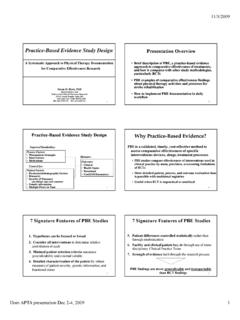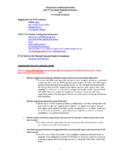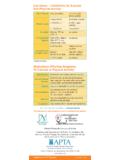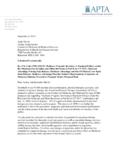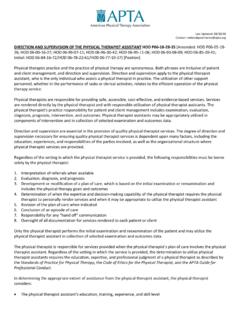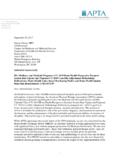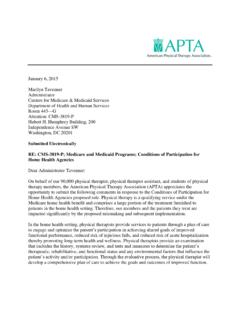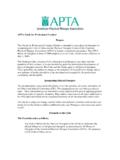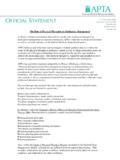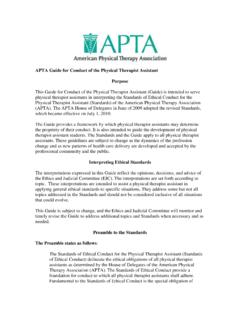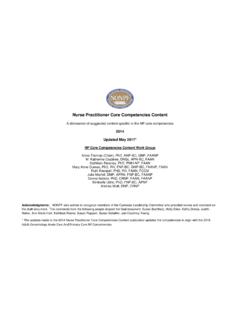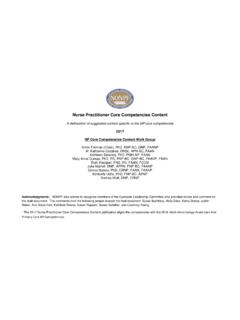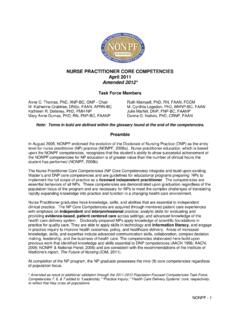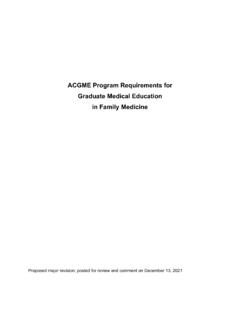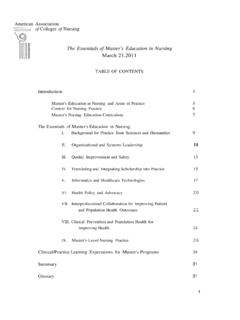Transcription of Core Competencies of a Physical Therapist Resident
1 core Competencies of a Physical Therapist Resident January 2020 2020 American Physical Therapy Association. All rights reserved. Table of Contents I. Background .. 1 Introduction .. 1 Special Note .. 2 II. Terminology Defined .. 3 Domains of Competency .. 3 Competencies .. 3 Milestones .. 3 Relationship Between DOC, Competencies , and Milestones .. 4 III. core Competencies of a Physical Therapist Resident .. 6 Domain of Competence 1: Clinical Reasoning .. 6 Domain of Competence 2: Knowledge for Specialty Practice .. 6 Domain of Competence 3: Professionalism .. 7 Domain of Competence 4: Communication .. 7 Domain of Competence 5: Education.
2 8 Domain of Competence 6: Systems Based Practice .. 8 Domain of Competence 7: Patient Management .. 9 IV. Physical Therapist Residency Competency Evaluation Instrument .. 10 Instructions for the faculty.. 10 Milestones.. 10 Instructions for the Resident .. 11 Physical Therapist Residency Competency Evaluation Instrument .. 12 V. 25 Copyright 2019 American Physical Therapy Association. All rights reserved. Alternation of the instrument in any manner is not permitted. Use of this instrument other than for its evaluative purposes by a clinical residency education program is not permitted without prior written approval from APTA. Clinical residency education programs may post this document on their institution s intranet (password-protected area).
3 This document may not be redistributed in any medium, including but not limited to, publicly posting on a website. Contact for other uses. American Physical Therapy Association / 1 I. Background Introduction The American Physical Therapy Association, in collaboration with the American Board of Physical Therapy Residency and Fellowship Education, established a work group in 2014 consisting of 10 Physical therapists, representing all areas of specialty practice, with various residency roles, including residency directors, didactic and clinical faculty, and graduates. The purpose of this work group was to create a set of core Competencies expected of a Physical Therapist Resident upon graduation from the program.
4 These domains of competence are broad in nature, representing the residency expectations of all specialty areas of practice. After establishing Resident domains of competence, the work group was directed to create an evaluation instrument to measure Resident achievement of the Competencies . These Competencies and the associated evaluation instrument were forwarded to interested stakeholders through in-person and electronic open-feedback forums to obtain widespread written and verbal feedback prior to refining the draft instrument suitable for psychometric testing. Additional expert opinion was collected from medicine and other health professions in order to gain insight into positive and negative outcomes experienced in competency-measurement processes.
5 The reasons for developing this instrument are threefold. First, it defines the expectations of residency education for individuals undergoing residency training, the program, and society by providing a consistent set of core Competencies . Second, the instrument identifies and measures the capabilities of Physical Therapist residents using milestones as they progress through training, while at the same time identifying their strengths and weaknesses in a timely manner. Finally, the Competencies , with their associated evaluation instrument, assure the public that graduates of a Physical Therapist residency program have the knowledge, skills, and abilities they need to perform their roles in society.
6 This instrument is not, however, intended to replace programs live patient examinations or specialty-specific skill assessments ( , Objective Structured Clinical Examinations). Using and analyzing resources from other health care professional organizations including the Accreditation Council for Graduate Medical Education (related to its identified residency Competencies and milestones) and the Description of Specialty Practice documents from the American Board of Physical Therapy Specialties the work group identified commonalities in knowledge, skills, and attributes for all defined areas of Physical Therapist specialties. At the same time, the work group considered the Physical Therapist education, entry-level Competencies , and expected outcomes of residency training.
7 Through continued discussion and refinement, the work group established seven domains of competence, with associated graduation milestones, for Physical Therapist residents in all areas of specialty practice. Each competency includes milestones, using Bloom s Revised Taxonomy classifications. The performance of each milestone is assessed independent of other milestones for that domain of competence. At the end of this document is a glossary that defines terms and concepts used throughout. Terms defined in the glossary are bolded in this document. core Competencies of a Physical Therapist Resident American Physical Therapy Association / 2 Special Note APTA would like to thank the members of the Residency Competency Work Group who dedicated their time and efforts to create these core Competencies and the evaluation instrument.
8 Lisa Black, PT, DPT Helen Carey, PT, DHSc Board-Certified Clinical Specialist in Pediatric Physical Therapy Penny Goldberg, PT, DPT, ATC Greg Hartley, PT, DPT Board-Certified Clinical Specialist in Geriatric Physical Therapy Fellow National Academies of Practice Certified Exercise Expert for Aging Adults Ellen Hillegass, PT, EdD, FAPTA Board-Certified Clinical Specialist in Cardiovascular and Pulmonary Physical Therapy Jacqueline Osborne, PT, DPT Board-Certified Clinical Specialist in Geriatric Physical Therapy Certified Exercise Expert for Aging Adults Rachel Tabak Tran, PT, DPT Board-Certified Clinical Specialist in Neurologic Physical Therapy Emmanuel Yung, PT, DPT, MA Board-Certified Clinical Specialist in Orthopaedic Physical Therapy Fellow of the American Academy of Orthopaedic Manual Physical Therapists Masaru Teramoto, PhD, MPH (statistician/primary investigator) In addition, APTA would like to thank the following individuals for their contributions to the work group: Jody Frost, PT, DPT, PhD Fellow of the National Academies of Practice Kendra L.
9 Harrington, PT, DPT, MS Board-Certified Clinical Specialist in Women s Health Stephanie McNally, BA Charles Sheets, PT Board-Certified Clinical Specialist in Orthopaedic Physical Therapy Board-Certified Clinical Specialist in Sports Physical Therapy Diploma in Mechanical Diagnosis and Therapy American Physical Therapy Association / 3 II. Terminology Defined Domains of Competency There are seven Domains of Competence for Physical Therapist residency education with an associated descriptor: 1. Clinical Reasoning: Demonstrates the ability to organize, synthesize, integrate, and apply sound clinical rationale for patient management. 2. Knowledge for Specialty Practice: Demonstrates the ability to organize, synthesize, integrate, and apply to practice specialty knowledge and skills.
10 3. Professionalism: Conducts self in a manner consistent with the APTA Code of Ethics, inclusive of APTA s Professionalism in Physical Therapy: core Values, in professional roles and professional responsibilities. 4. Communication: Uses effective strategies to clearly and accurately disseminate and receive information in a respectful manner that considers situational needs and results in intended outcomes. 5. Education: Designs, directs, and implements learner-centered instructional activities in clinical, academic, or community settings to advance Physical Therapist practice. 6. Systems-based Practice: Demonstrates an awareness of and responsiveness to the larger context and system of health care in order to provide care that is of optimal value.
